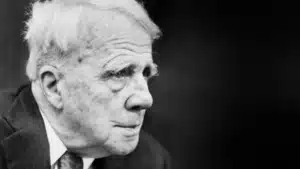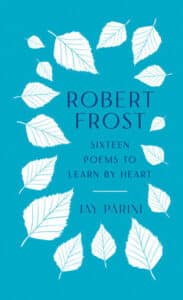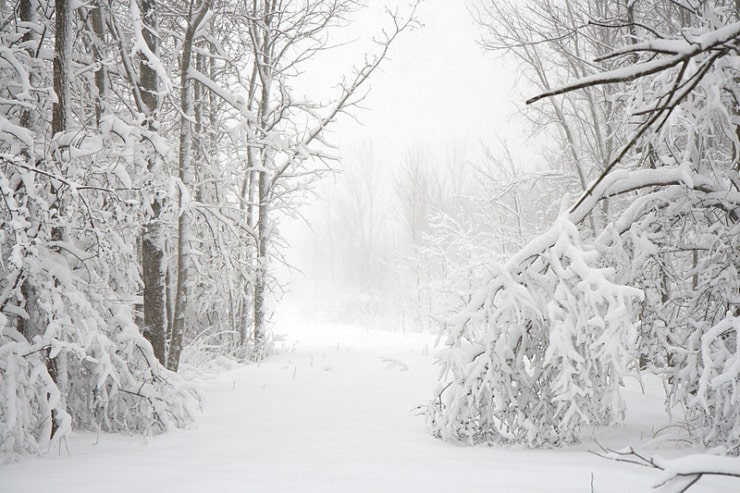Jay Parini has a beauty of a book on memorizing classic Frost poems
I had the benefit of having a nonstop string of excellent English teachers in middle and high school. In 8th grade, Mrs. Leavell introduced us to Ernest Hemingway. Miss Roark in 9th grade helped a class of 35 boys discover Great Expectations, which turned out to be a great book for 14-year-old boys. Miss Campbell in 10th grade helped us understand Shakespeare’s Julius Caesar. In 11th grade, when Mrs. Prince wasn’t celebrating Jacqueline Susann’s The Valley of the Dolls (which she did not have us read), she’d rhapsodize about Thornton Wilder’s Our Town and Mark Twain’s Huckleberry Finn. And in 12th grade, Miss Shorey guided 30 boys through the late 16th century Spain of Don Quixote.
As individual as they were, all my English teachers held one writer or poet in common esteem, the one considered the “American poet,” even when we studied world or English literature. This was the poet who, along with T.S. Eliot, all my teachers had studied when they were in middle and high school as well as college.

Robert Frost
Frost (1874-1963) almost didn’t turn out to be a poet; his first career was as chicken farmer in New England. But his father died, and Frost sold his own farm and moved to England, where his verses came to the attention of Ezra Pound. Pound “discovered” Frost about a year before he met Eliot, another American in England. Frost’s first two collections, A Boy’s Will (1913) and North of Boston (1914), were published first in England and then in the United States.
Together, those two collections catapulted Frost into the very top tier of American poets. Even today, more than a century later, you can’t think of American poetry without including “Mending Wall,” “The Road Not Taken,” and “Stopping by Woods on a Snowy Evening.”
It’s no surprise that I studied Robert Frost’s poetry in every English class from 8th through 12th grades, including the year that was supposed to be about English and world literature (Miss Shorey justified studying Frost in 12th grade because he was a “world poet”). I’m not sure which teachers had our classes memorize “The Road Not Taken” and “Stopping by Woods on a Snowy Evening,” but memorize them we did.
Jay Parini would likely applaud all my English teachers.

In 115 highly readable pages, Parini packs 16 of Frost’s best-known poems, a succinct but deep analysis of each, and how the poems relate to the poet’s life. Parini knows poetry, and he knows his Frost. If you’re not familiar with Frost other than two or three of his classic poems, this book makes for an excellent introduction.
One example will suffice. In discussing Frost’s poem “After Apple-Picking,” Parini says this: “Whenever I read this poem, I think of Frost’s voluminous notebooks, which are full of fragments of poems, odd lines, titles, aborted phrases that might, if lingered on properly, have been turned into poems. These are the unpicked apples in Frost’s poem, apples he can ‘Cherish in hand.’ They will ultimately fall to the ground, where they will be gathered into the ‘cider-apple heap,’ where they will be pressed for cider.”
I ask myself if I would have seen that, without knowing about Frost’s “voluminous notebooks”? You might say that it’s just a poem about picking apples and missing the ones too high in the tree to reach. But Frost rarely if ever wrote a poem that was only about the ostensible subject. That’s some of the value Parini brings to the table.

Jay Parini
He also notes the value of memorizing poetry. Frost wrote in familiar forms, Parini says, like blank verse, stanzas, and sonnets. Those forms weren’t simply invented as tools; the rhythm and cadence correspond to something distinctly human in all of us.
Can you enjoy Frost’s poetry without an understanding like this? If I remember my 13- and 14-year-old self correctly, the answer is “of course.” But Parini, in Robert Frost: Sixteen Poems to Learn by Heart, has done what the best critics do. He’s brought a new level of understanding to what has become so well-known that it’s almost a commonplace.
And he’s done it very concisely. That’s something of a poetic achievement by itself.
Related:
Robert Frost and The Road Not Taken
Taking a Scottish Road Trip with Jorges Luis Borges
Committing Prufrock: 10 Reasons to Commit to Saying Yes to Memorizing Poetry
By Heart: “I So Liked Spring” – New Robert Frost Challenge
Photo by Beige Alert, Creative Commons, via Flickr. Post by Glynn Young.
How to Read a Poem uses images like the mouse, the hive, the switch (from the Billy Collins poem)—to guide readers into new ways of understanding poems. Anthology included.
“I require all our incoming poetry students—in the MFA I direct—to buy and read this book.”
—Jeanetta Calhoun Mish
- Poets and Poems: Peter Murphy and “You Too Were Once on Fire” - October 14, 2025
- “Your Accent! You Can’t Be from New Orleans!” - October 9, 2025
- Poets and Poems: Donna Vorreyer and “Unrivered” - October 7, 2025


Kortney Garrison says
I just read Borges and Me and am knee deep in The Way of Jesus. Jay Parini is a keeper!
Glynn Young says
I really enjoyed the book on Borges. What an experience for a young man to have!
Kortney Garrison says
In The Way of Jesus he relates a story about drinking martinis with Auden!